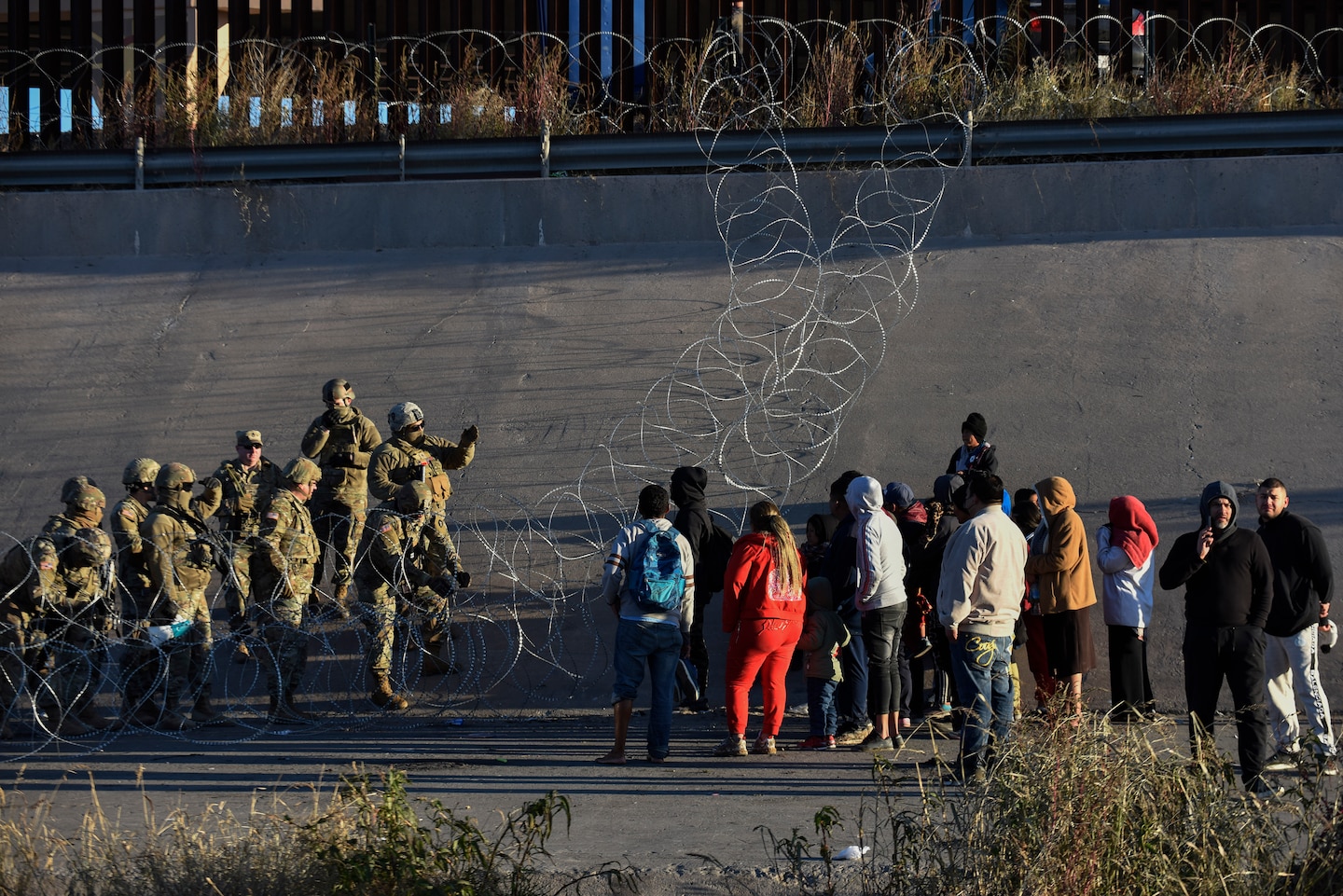While it’s not unusual for state governors to deploy National Guard troops to aid federal authorities patrolling the border, the use of soldiers to physically stop migrants from entering the country appeared to be an escalation of force by the Texas governor, one of Biden’s fiercest critics.
Thousands of border-crossers have waded across the shallow river in recent weeks as anticipation builds for the expiration of the Title 42 public health policy, which the government has used to expel migrants more than 2 million times since it was implemented in March 2020.
The National Guard said its soldiers are attempting to direct migrants to official border crossings. But those crossings remain essentially closed to asylum seekers while Title 42 — a pandemic-era policy introduced as a way to stem the spread of the coronavirus — remains in effect.
“The service members are erecting concertina barrier as needed to funnel migrants to the designated points of entry,” the Texas National Guard said in a statement, referring to the official crossings operated by U.S. Customs and Border Protection. “The primary goal of the Texas Army National Guard is to prevent illegal crossings into Texas.”
Abbott’s show of force reflected the political furor, mostly among Republicans, over the president’s border policies, and added to the logistical complexities Biden is facing as he attempts to fulfill promises to fully restore migrants’ access to the U.S. asylum system at a time when authorities are overwhelmed by record numbers of immigration arrests.
American Civil Liberties Union lawyer Lee Gelernt, who sued along with other organizations to end Title 42, said Abbott has no legal right to stop migrants from seeking asylum anywhere on the border. “What Texas is doing by preventing people from seeking asylum is patently unlawful and should stop immediately,” he said in an interview.
The Texas governor published a letter to Biden on Tuesday, calling the strain on U.S. border communities such as El Paso “a catastrophe of your own making.”
“These communities and the state are ill-equipped to do the job assigned to the federal government — house the thousands of migrants flooding into the country every day. With perilous temperatures moving into the area, many of these migrants are at risk of freezing to death on city streets. The need to address this crisis is not the job of border states like Texas.”
The military deployment added to an already tumultuous period at the border and in Washington, where the administration’s preparations to end Title 42 on Wednesday were temporarily paused by Supreme Court Chief Justice John Roberts.
The Biden administration told the Supreme Court on Tuesday that it should be allowed to end the policy, but would like to have a few more days to prepare.
Solicitor General Elizabeth B. Prelogar said in a court filing that the federal government recognizes that lifting Title 42 “will likely lead to disruption and a temporary increase in unlawful border crossings.” But she wrote that the solution to that immigration problem “cannot be to extend indefinitely a public-health measure that all now acknowledge has outlived its public-health justification.”
The government, she continued, is prepared to increase resources and to “implement new policies in response to the temporary disruption that is likely to occur whenever the Title 42 orders end.”
She asked that if the Supreme Court sides with the Biden administration’s attempt to end Title 42, the policy remain in place until Dec. 27, after Christmas.
“The necessary coordination within the government and with our foreign partners and non-governmental organizations would be especially challenging over the upcoming holiday weekend, a time when many of these partners are operating with reduced staffing,” Prelogar told the court. She called the Title 42 wind-down “a complex, multi-agency undertaking with policy, operational, and foreign relations dimensions.”
With stranded migrants, including families with children, crowding into shelters, the city’s airport and on the streets, El Paso Mayor Oscar Leeser declared a state of emergency over the weekend after busloads of migrants, mostly from Nicaragua, crossed the border in long single-file lines. Nicaraguans are among the nationalities that Mexican authorities generally do not take back under the Title 42 policy, so many were quickly processed by Customs and Border Protection and released into the city.
Along Leon Street and surrounding neighborhood blocks in El Paso, dozens of migrants sought help on Tuesday. For many it was as simple as a bus ticket. Others were caught in limbo. Kerwin Ortiz, 27, came with wife Yenny Gallardo, 28, and their four children; Winderly Gallardo, 12; Exnnider Gallardo, 11; Thoymer Gallardo, 7; and Hanny Gallardo, 2. Yenny is also 8 months pregnant.
It took the family three and a half months to make the journey from Venezuela, Ortiz said. They were trying to reach New York, where Ortiz said he has a cousin.
“Thank God we are okay,” Ortiz said. “Our kids are warriors.” The family found refuge at a shelter for the night, but spent the day watching their children playing along the sidewalk.
“We aren’t sure how we are going to make it without money,” he said. “We left Venezuela without any cash, and now we are here without cash.”
Their youngest child, 2-year-old Hanny, walked around the family in pink shoes and a pink coat. “I carried her on my shoulders,” Ortiz said, when asked how the family was able to make the journey with such a small child. “Sometimes she would cry because we were walking too fast, other times because we wouldn’t pick her up, and other times because she didn’t want to be picked up.”
A block north of the Gallardo family, along West Overland Avenue, more migrants were huddled against the buildings and the outside walls of the bus station. Others hunched over on their phones trying to get in touch with relatives, friends, acquaintances — anyone that would take them in or lend them a hand.
Jose Angel, 18, said he had been trying to contact his friends and family in Fort Worth, without any luck. He said it has taken him a month and a half to get to El Paso. He left Nicaragua with $600 in his pocket, but has nothing left.
“It’s been a journey,” Angel said. “My friend and I had to run, we were scratched up and hungry and cold. But I thank God because we are here.”
“There are good people here,” he said, looking for a seat on a bus — any bus — headed toward Fort Worth.
Miroff and Marimow reported from Washington. Maria Sacchetti contributed to this report.



